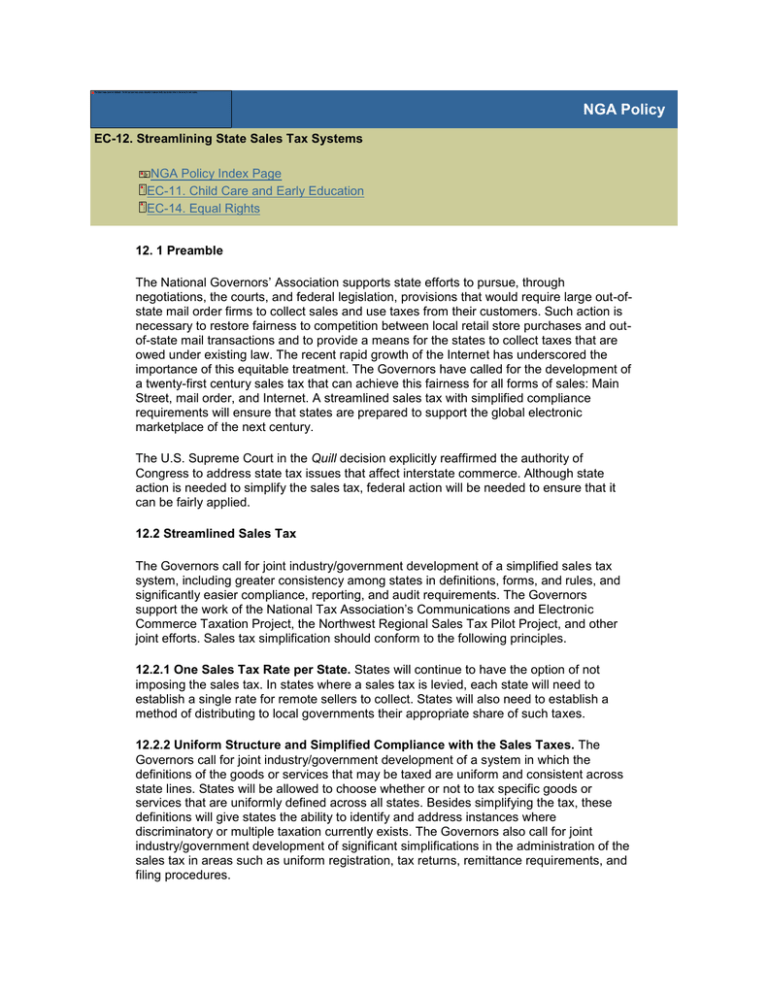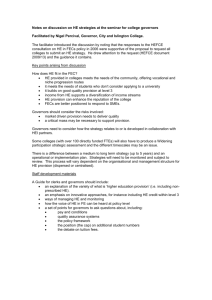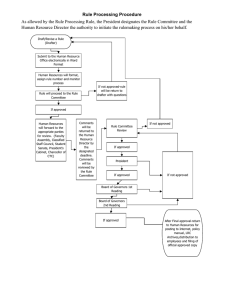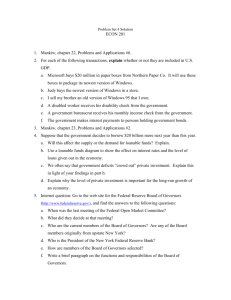
NGA Policy
EC-12. Streamlining State Sales Tax Systems
NGA Policy Index Page
EC-11. Child Care and Early Education
EC-14. Equal Rights
12. 1 Preamble
The National Governors’ Association supports state efforts to pursue, through
negotiations, the courts, and federal legislation, provisions that would require large out-ofstate mail order firms to collect sales and use taxes from their customers. Such action is
necessary to restore fairness to competition between local retail store purchases and outof-state mail transactions and to provide a means for the states to collect taxes that are
owed under existing law. The recent rapid growth of the Internet has underscored the
importance of this equitable treatment. The Governors have called for the development of
a twenty-first century sales tax that can achieve this fairness for all forms of sales: Main
Street, mail order, and Internet. A streamlined sales tax with simplified compliance
requirements will ensure that states are prepared to support the global electronic
marketplace of the next century.
The U.S. Supreme Court in the Quill decision explicitly reaffirmed the authority of
Congress to address state tax issues that affect interstate commerce. Although state
action is needed to simplify the sales tax, federal action will be needed to ensure that it
can be fairly applied.
12.2 Streamlined Sales Tax
The Governors call for joint industry/government development of a simplified sales tax
system, including greater consistency among states in definitions, forms, and rules, and
significantly easier compliance, reporting, and audit requirements. The Governors
support the work of the National Tax Association’s Communications and Electronic
Commerce Taxation Project, the Northwest Regional Sales Tax Pilot Project, and other
joint efforts. Sales tax simplification should conform to the following principles.
12.2.1 One Sales Tax Rate per State. States will continue to have the option of not
imposing the sales tax. In states where a sales tax is levied, each state will need to
establish a single rate for remote sellers to collect. States will also need to establish a
method of distributing to local governments their appropriate share of such taxes.
12.2.2 Uniform Structure and Simplified Compliance with the Sales Taxes. The
Governors call for joint industry/government development of a system in which the
definitions of the goods or services that may be taxed are uniform and consistent across
state lines. States will be allowed to choose whether or not to tax specific goods or
services that are uniformly defined across all states. Besides simplifying the tax, these
definitions will give states the ability to identify and address instances where
discriminatory or multiple taxation currently exists. The Governors also call for joint
industry/government development of significant simplifications in the administration of the
sales tax in areas such as uniform registration, tax returns, remittance requirements, and
filing procedures.
One potential approach to administration of sales taxes would be to encourage
establishment of a system of independent third-party organizations that would be
responsible for remitting taxes to the states. Remote sellers would use a software
package preapproved by the states that would calculate the tax due on the purchase
based on the state rate where the item is sent, and electronically remit that tax to the
collection organization. Remote sellers that opt to use the third-party system would enjoy
additional benefits of compliance, including not filing returns and not remitting funds to
states.
12.3 Expanded Duty to Collect
The Governors call on Congress to re-establish fairness in state sales tax systems by
requiring remote sellers to collect sales taxes for any state that simplifies its tax system in
accordance with the foregoing principles. States that choose not to simplify the sales tax
would retain a narrow and limited physical nexus standard. The expanded duty to collect
would require remote vendors to collect sales and use tax in every state where they sold
taxable products and services only if:
they had national sales above some de minimis level in the past year; and
they had sales to that individual state’s consumers above some lower de minimis
level in the past year.
It is the Governors’ intention that small companies (for example with annual gross sales
below $100,000 or $200,000) should not be required to collect state sales taxes on outof-state sales except under the proposed independent third-party administration system
described above. Even in that instance, there should be no charge to such small
companies.
Time limited (effective Winter Meeting 1999–Winter Meeting 2001).
Adopted Winter Meeting 1999.
The Governors | The Organization | The Center | The Issues | News | Site Directory | Store
© 1999 Copyright National Governors' Association. All rights reserved.
Comments? Visit our Contact NGA page.
If you would like to provide site feedback, contact the NGA Webmaster by e-mail.






